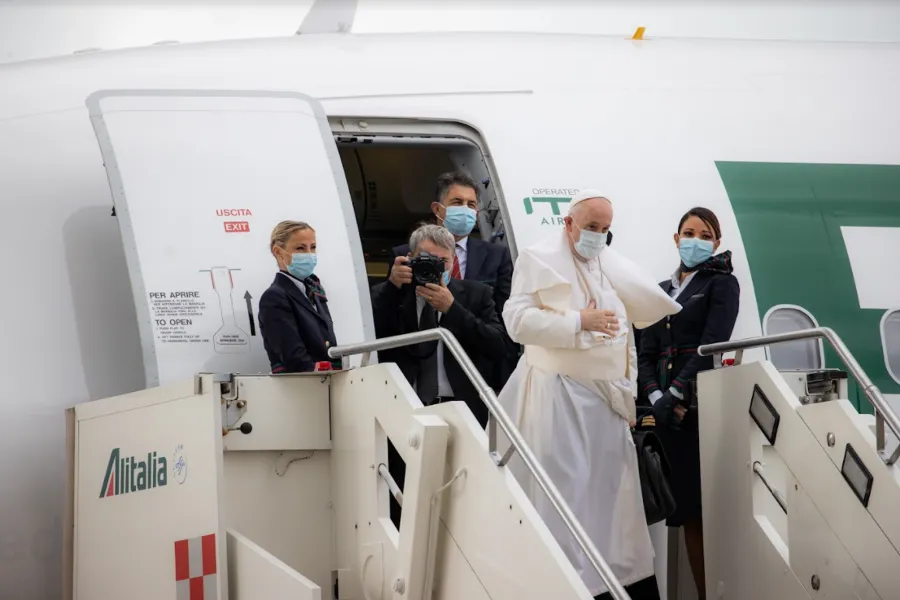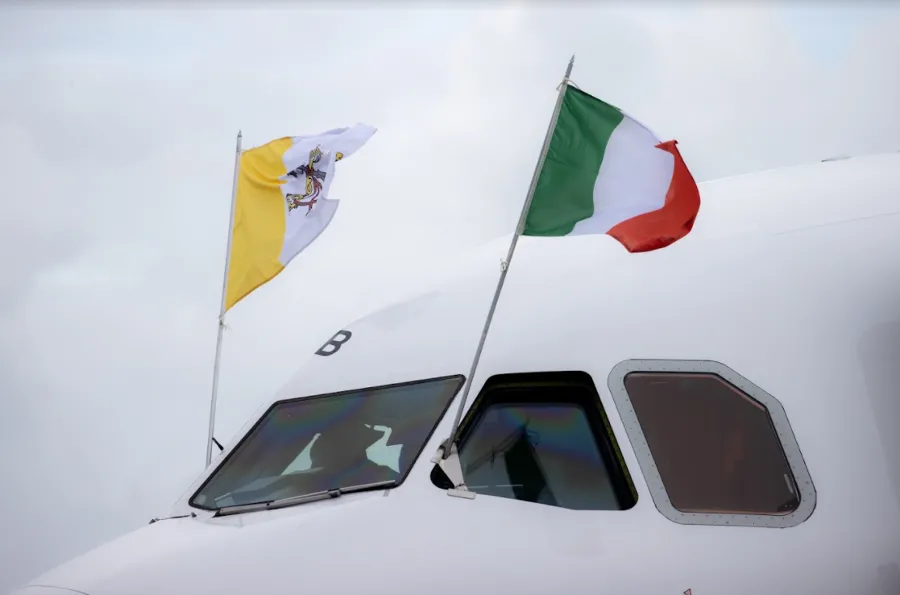
Rome Newsroom, Dec 2, 2021 / 08:47 am (CNA).
On his first day in Cyprus, Pope Francis invited the Catholic community to promote a spirit of fraternity in the island country, which is divided by a U.N. buffer zone.
“We need a fraternal Church, one that is an agent of fraternity in our world,” the pope said Dec. 2, shortly after arriving in Nicosia, the divided capital city.
In his speech at the Maronite Cathedral of Our Lady of Grace, Francis said that “in Cyprus, there are many spiritual and ecclesial sensibilities, different backgrounds and histories, different rites and traditions. Yet we should not experience diversity as a threat to identity; no, we should not be jealous or defensive.”
“If we fall into this temptation, then fear grows, and fear gives rise to distrust, distrust leads to suspicion and then, sooner or later, to conflict,” he continued. “We are brothers and sisters, loved by a single Father.”
Pope Francis landed Thursday afternoon in Cyprus at the start of a five-day trip that will also take him to Athens, Greece, and the island of Lesbos. The visit is expected to highlight the plight of migrants, since both countries have been major stopping points for migrants and refugees seeking to enter Europe, mainly from the Middle East and Africa.
The pope touched down at Larnaca International Airport, then traveled the 31 miles to Nicosia by car.
Addressing Catholic priests, consecrated, deacons, catechists, and ecclesial associations and movements of Cyprus, he said: “By your spirit of fraternity, you can remind everyone, and Europe as a whole, that we need to work together to build a future worthy of humanity, to overcome divisions, to break down walls, to dream and work for unity. We need to welcome and integrate one another, and to walk together as brothers and sisters, all of us.”

The predominantly Orthodox Christian Republic of Cyprus has a population of 1.2 million people, just 10,000 of whom are Catholic.
The island is split by a U.N. buffer zone, with the de facto state of Northern Cyprus located on the northeastern portion of the island. The predominantly Sunni Muslim territory is recognized only by neighboring Turkey, which invaded Cyprus in 1974, and is regarded by all other states as part of the Republic of Cyprus.

Before leaving the Vatican on Dec. 2, Francis greeted around 12 migrants from Afghanistan, Somalia, Congo, and Syria, now living in Italy. Some of them were migrants who came to Rome on the plane with Pope Francis after his 2016 visit to Lesbos.
On his way to the airport, the pope stopped to meet another group of immigrants hosted by the Church of Santa Maria degli Angeli, a parish close to Fiumicino Airport. While there, he also prayed before an image of Our Lady of Loreto.
The night before the trip, Francis made his customary stop at the Basilica of St. Mary Major to visit the icon of Mary, Salus Populi Romani, to ask for her intercession for his travels.

Cyprus and Greece are significant in early Christian history, because the Apostles St. Paul and St. Barnabas traveled to the Mediterranean countries to bring the Gospel. The Acts of the Apostles records that St. Paul stopped in Cyprus and converted the Roman Proconsul Sergius Paulus to Christianity. The Apostle also famously preached on the streets of Athens.
Patriarch Pierbattista Pizzaballa, the Latin Patriarch of Jerusalem, and Cardinal Bechara Boutros Rai, the head of the Maronite Church, traveled from the Holy Land and Lebanon to be present at the pope’s encounter with Maronite and Latin Catholics in Cyprus Dec. 2.
The Maronite Church is one of the 23 autonomous Eastern Catholic Churches in full communion with Rome. There are an estimated 3 million Maronite Catholics worldwide, around a million of whom live in Lebanon.
After listening to songs and testimony from Raï and two religious sisters, Pope Francis spoke about St. Barnabas, the apostle who was born on the island of Cyprus.
Barnabas “was a great man of faith and wisdom chosen by the Church in Jerusalem — the Mother Church, we could say — as the person best suited to visit a new community, that of Antioch, made up of a number of recent converts from paganism,” Francis said, praising the patience that Barnabas showed to “people coming from another whole world, another culture, another religious sensibility.”
“They were people who had just had a life-changing experience; theirs was a faith full of enthusiasm, yet still fragile,” he said.
Barnabas, he added, had “the patience of discernment that is capable of perceiving the signs of God’s work in every place, the patience to ‘study’ other cultures and traditions. Above all else, Barnabas had the patience of accompaniment … he did not overwhelm the fragile faith of the newcomers by taking a rigorous and inflexible approach, or by making excessive demands about the observance of precepts. He accompanied them, taking them by the hand and dialoguing with them.”
Pope Francis invited Catholics in Cyprus to have the same patience.
“The work you are carrying out on this island, as you welcome new brothers and sisters arriving from other shores of the world, is precious,” he said. “Like Barnabas, you too are called to foster a patient and attentive outlook, to be visible and credible signs of the patience of God, who never leaves anyone outside the home, bereft of his loving embrace.”
He pointed out that Barnabas is also a good example of fraternity, as seen in his friendship with St. Paul, which they were able to maintain even through disagreements about how to carry out their mission.
“I share with you my joy in visiting this land and journeying as a pilgrim in the footsteps of the great apostle Barnabas, a son of this people, a disciple who loved Jesus and a fearless herald of the Gospel,” Pope Francis said.
“As he visited the emerging Christian communities, [Barnabas] saw the grace of God at work; he rejoiced and urged everyone ‘to remain faithful to the Lord with steadfast purpose’ (cf. Acts 11:23). I come with the same desire: to see the grace of God at work in your Church and in your land, to rejoice with you at the wondrous things the Lord has done, and to urge you to persevere always, without growing weary or discouraged,” he said.
If you value the news and views Catholic World Report provides, please consider donating to support our efforts. Your contribution will help us continue to make CWR available to all readers worldwide for free, without a subscription. Thank you for your generosity!
Click here for more information on donating to CWR. Click here to sign up for our newsletter.




Leave a Reply